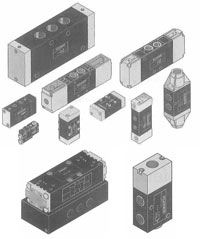Flow Control Valves
A flow control valve is employed to regulate the rate, direction, and pressures for fluid lines within hydraulic fluid power circuits. Various types of valves perform differently. These differences allow for optimal usage during different scenarios.
For instance, certain types of pneumatic valves can regulate flow while also enabling it to pass through to other sections. Other types are simpler and give users three basic options: change direction, pass, and stop. A traditional version of a flow control valve will come with a changeable aperture that can slow down or speed up flow rates.
Pneumatic systems rely heavily on the ability for the user to control the pressure and flow of fluids. In this system, the role of a flow control valve is to lessen the rate of flow in specific sections of the system (resulting in slower actuator speeds). Air will move in one direction that allows for the free movement in the opposing direction. Different types of flow control valves allow machines to complete various tasks.
Movement inside a system is proportionate to the speed. Through raising the flow in an actuator, it will increase the overall speed. Flow control valves require pressure differentials between upstream and downstream, which allows them to function properly. The valve is connected as a means to control existing pressure from exhaust. Pneumatic valves are important for the overall function of pneumatic systems.
Related Reading Pneumatic Valves
- The Basics of Pneumatic Valves
Most pneumatic valves come with directional control valves. Control valves are designed to work in several different applications including aerospace, mining, and military.
- Pneumatic Valve Configurations
One of the most basic types of systems and applications found in pneumatic valves are flow control valves. These type of valves are used in several different ways, and they offer two configurations. - Valve Directional-Control
An extraordinarily complex area for pneumatic valves is directional-controls. Directional-controls are a vital part of valves. These controls can direct or block airflow. Additionally, they monitor the speed or sequence of operations. - Types of Pneumatic Flow Control Valves
- Pneumatic Systems and Safety
- Advantages of Pneumatic Systems


- Ellis/Kuhnke Controls
132 Lewis Street Unit A-2, Eatontown, N.J. 07724
Phone: 1-800-221-0714
Fax: 732-291-8154
Email: Info@ekci.com
- Home Pneumatic Controls Technical Info CAD Drawings Contact Us Pneumatic Timers Blog Site Map
